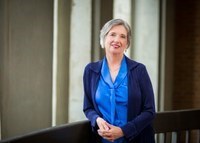1. What processes do you have to ensure that all new faculty, especially pre-tenure faculty, are offered a mentor if they want one?
Currently, the Chair of each department serves as the primary mentor to junior faculty given that the ratio of faculty of advanced rank to entry-level rank is low. The Chair meets with the department faculty on a one-to-one basis to discuss faculty development, promotion and tenure issues, and progress towards goals at least once per year. The Chair and Associate Dean for Faculty Affairs are actively involved in reviewing and assisting faculty who are eligible for promotion and/or tenure. In some departments, informal meetings with faculty occur each semester to discuss and track career progress. Mentoring takes place individually, as needed, for teaching, research, service, and professional development.
2. Do you tract how many faculty are mentored, and if so, how?
Tracking of faculty who are being mentored is primarily accomplished through the annual work plan and assessment. Some Chairs informally keep track of their faculty members’ individual professional development needs.
3. Do you evaluate the success of the program, and if so how?
Although there are discussions related to success with grant writing, improved course evaluations, publications, etc. these are not formally tracked as part of mentoring. For example, the School keeps tract of teaching and service awards and separately keeps track of funded grants and more recently keeps track (by self-reporting via Digital Measures) published works and presentations at local, regional and national meetings. As a new unit, the SPHIS has only recently (over the past three years) had faculty members who were eligible to move forward for either promotion and/or tenure. All faculty members whose dossiers were submitted to the Office of the Provost were recommended to and approved by the Board of Trustees.
4. Do you have a "train the mentor" program or other ways of ensuring good quality mentoring?
No. However, we are planning to address the issue of mentoring and the possible initiation of such a program in conjunction with the Delphi Center and the Office of the Provost. We plan to work towards a program that will address the association of mentoring with research and scholarship.
Contact
 |
Kathy Baumgartner |
|---|
